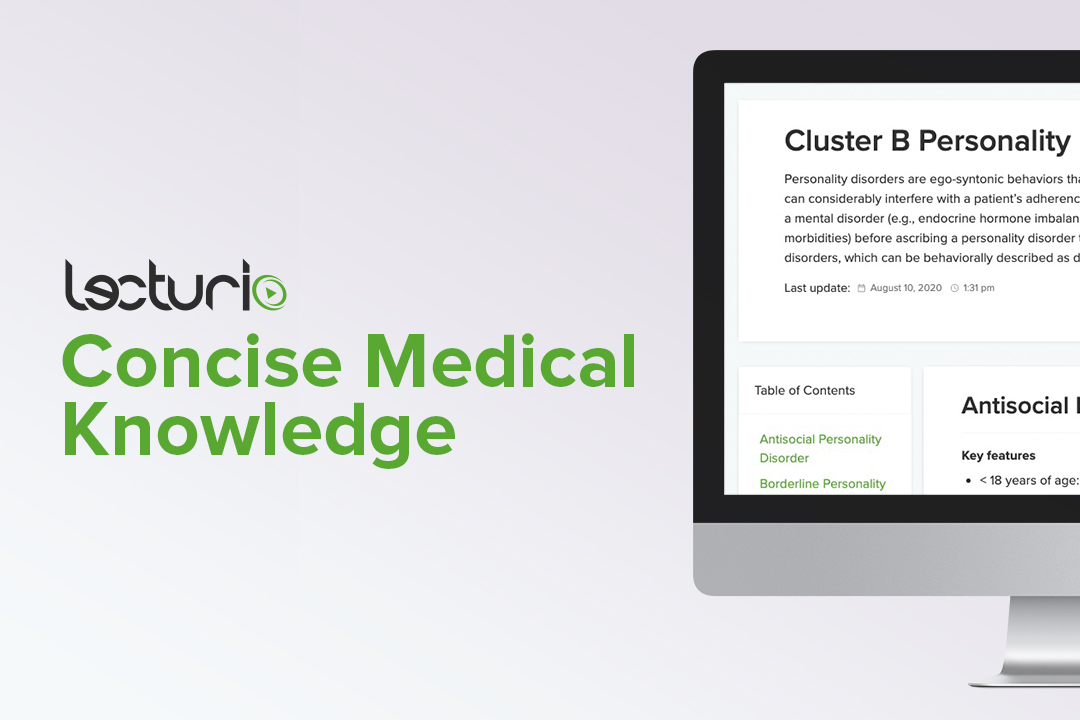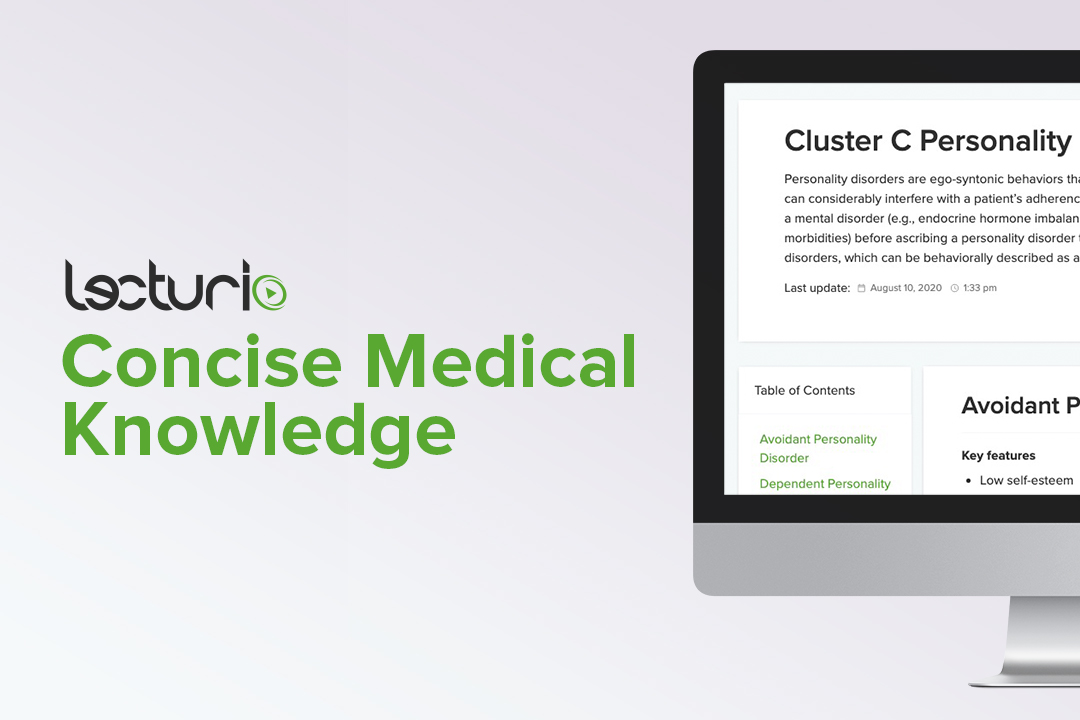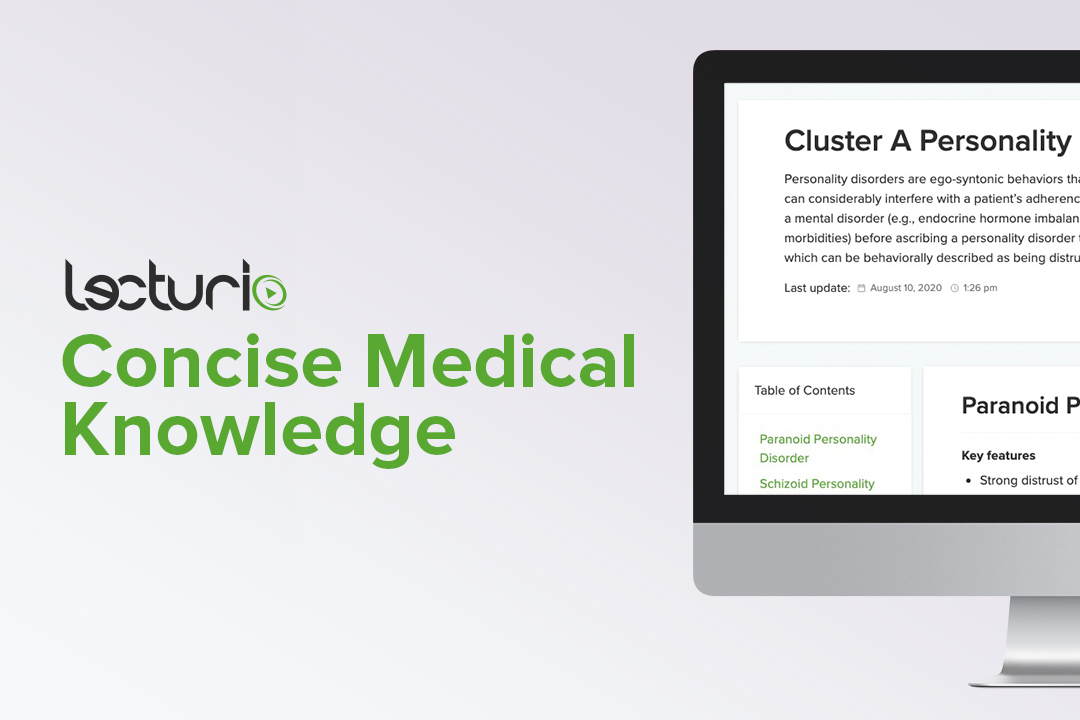Playlist
Show Playlist
Hide Playlist
Overview of Personality Disorders
-
Slides OverviewPersonalityDisorders Psychiatry.pdf
-
Download Lecture Overview
00:01 We're going to talk about personality disorders now. 00:04 And let's start with an overview before diving in into the individual types of disorders. 00:09 So before talking about a personality disorder, it's important to define what a personality actually is, it's something we all have right. 00:18 So our personalities consist of an enduring pattern of perceiving, relating to, and thinking about the environment and oneself that are exhibited across numerous social and personal contexts. 00:32 It's a set of stable predictable, emotional and behavioral traits that we all have, that's the personality. A personality disorder is a little bit different. 00:46 Important to know that personality disorders are ego-syntonic, meaning they don't disrupt to the individual who's experiencing them. 00:55 They are a set of behaviors, values, feelings, needs, goals, and ideal self-image that even the person with a personality disorder feels are in perfect harmony. 01:09 So they don't cause alarm to the individual who's affected. 01:14 In general, personality disorders are ingrained, and one, therefore, has very little insight into their being a problem. 01:22 Although the individual thinks that they are in perfect harmony things are actually far out of balance, and its usually close friends or family members, co-workers or classmates, who notice that something is off and will often encourage the person experiencing the disorder to seek some help. 01:43 When the patient comes in for some help, here's some ways to approach managing them which is very important, because, again, remember these people have very little insight into the fact that they have anything wrong with their personalities. 01:58 So it's important to align with the patient, let them feel trusted and secure, check your countertransference which is basically your response to the patient, establish concrete goals of treatment that you agree on, and introduce the idea of psychotherapy, which is actually the most useful form of therapy in helping with a personality disorder. Consider medication as a last resort in only if there are specific target symptoms that you want to address. 02:30 When it comes to personality disorders, the psychodynamic psychotherapy goal is to help the patient identify and address the manner in which personality style is maladaptive and thereby promote change by transforming what is an egosyntonic state into an egodystonic state. In other words, you're alerting the patient or individual to the fact, that they in fact are having some problems base on their ways of interrelating and behaving with the world around them. 03:03 Medication management is really going to be used only to treat any biological dimensions of personality that might respond to medication. So basically you're looking for target symptoms that might have a positive response to medicine, something like aggression, impulsivity, anxiety, depression or psychotic features. 03:27 When it comes to personality disorders, it was Sigmund Freud who believed that personality traits were the product of a fixation at a particular stage of psychosocial development. And in his famous psychoanalytic theory of personality, Freud states that personality is composed of three elements, the id, ego and superego. 03:52 Whereas Wilhelm Reich suggested that personality arose from the particular pattern of defense mechanisms. 04:01 These are unconscious mental processes that the ego uses to resolve and thereby reduced anxiety and stress. 04:10 There are different theories about how personality disorders arise, according to the DSM-5, there are ten different classification systems in which personality disorders are grouped. They are grouped into cluster A symptoms, which are usually familial and associated with psychotic disorders, or into cluster B which are also familial and more associated with mood disorders and then there's cluster C which are familial and associated with anxiety disorders. 04:43 So of the ten personality disorders, they each going to one of these three clusters. 04:48 Where do you think avoidant personality goes? That's right it's fairly anxiety-inducing, and so it goes into cluster C. Schizoid personality disorder, you might think that sounds a little bit psychotic and that goes into the cluster A of personality disorders. Histrionic is actually cluster B and so as borderline personality. 05:11 Narcissistic personality disorder or narcissism is also associated with cluster B symptoms. 05:18 And dependent personality goes into cluster C. Schizotypal personality disorder falls under cluster A. 05:26 And OCPD is a cluster C personality disorder. Paranoid is cluster A. 05:33 And anti-social is cluster B personality disorder. 05:39 We'll review each of these in more detail in subsequent lectures. 05:43 For now, what you need to know is to diagnose an overall personality disorder, patient must meet two of the following criteria and it must be an enduring pattern of their inner experience and weighing which they relate with the world around them. 05:59 So they have an altered cognition, basically trouble in their way of perceiving and interpreting their self, other people and events. 06:08 There's an alteration in affectivity, range, intensity, lability and appropriateness of emotional response. There's also some change in interpersonal functioning or impulse control. Furthermore, to meet criteria for any personality disorder, these symptoms must be enduring; inflexible and pervasive. 06:31 The enduring pattern leads to clinically significant distress or impairment in functioning, and the pattern is stable and of long duration meaning it traces back to probably adolescence, and it perseveres throughout adulthood. There's no better explanation and this cannot be better explained by another psychiatric disorder. 06:55 And of course, it's not attributed to the physiological effects of substance abuse or any other general medical condition. 07:03 We'll take a look in subsequent lectures about the individual personality disorders, but now you know the overarching theme of what a personality is and the different clusters that exist and how to start making your diagnostic assessment.
About the Lecture
The lecture Overview of Personality Disorders by Helen Farrell, MD is from the course Personality Disorders. It contains the following chapters:
- Overview
- Approach to Management
- DSM-5
Included Quiz Questions
Which of the following statements about personality disorders is FALSE?
- It is an enduring set of stable, predictable, emotional and behavioral traits
- Personality disorders are egosyntonic (non-disruptive for the individuals)
- They are a set of behaviors, values, feelings, goals, and ideal self-image
- They do not cause alarm to the individual
- They are ingrained, and the individual thinks there is perfect harmony
What is the approach to manage personality disorders?
- Align with the patient — establish goals — psychotherapy — medication
- Align with the patient — psychotherapy — establish goals — medication
- Establish goals — align with the patient — psychotherapy — medication
- Medication — align with the patient — establish goals — psychotherapy
- Establish goals — psychotherapy — medication — align with the patient
Which of the following is the therapeutic goal of psychodynamic psychotherapy when treating personality disorders?
- Transforming the ego — syntonic state to an ego — dystonic state
- Transforming an ego — dystonic state to an ego — syntonic state
- Improving symptoms such as aggression, impulsivity, anxiety, depression, and psychosis
- Changing aggression to psychosis
- Sedating the patient by using hypnosis
According to the DSM-5, Cluster B personality disorders have a familial association with which of the following?
- Mood disorder
- Anxiety disorder
- Psychotic disorder
- Depressive disorder
- Obsessive compulsive disorder
Which of the following personality disorders are included in Cluster C personality disorders?
- Dependant
- Histrionic
- Paranoid
- Schizoid
Customer reviews
5,0 of 5 stars
| 5 Stars |
|
5 |
| 4 Stars |
|
0 |
| 3 Stars |
|
0 |
| 2 Stars |
|
0 |
| 1 Star |
|
0 |






